Have you ever seen an ad for a fitness app or meal plan kit and thought “I have to try that?” Maybe it makes sense for your lifestyle or speaks to a hidden desire you have. Fitness ads are most effective when they speak to aspects of identity. And brands do that in two ways.
The Identity Matrix: aspirational vs. relatable content
Social media has made healthy living more accessible than ever before. Now, whenever you log into Facebook, YouTube, Snapchat, or Instagram, you can watch workout videos, find delicious recipes, or discover a new fitness studio. And yet, when it comes to fitness, the first step is often the hardest. We need to feel confident we can do it.
The best fitness ads tune into who we are now and who we want to be. But most fitness ads focus on one or the other. They’re either aspirational content or relatable. We’ve built a simple model for understanding this. Let’s call it the Identity Matrix.
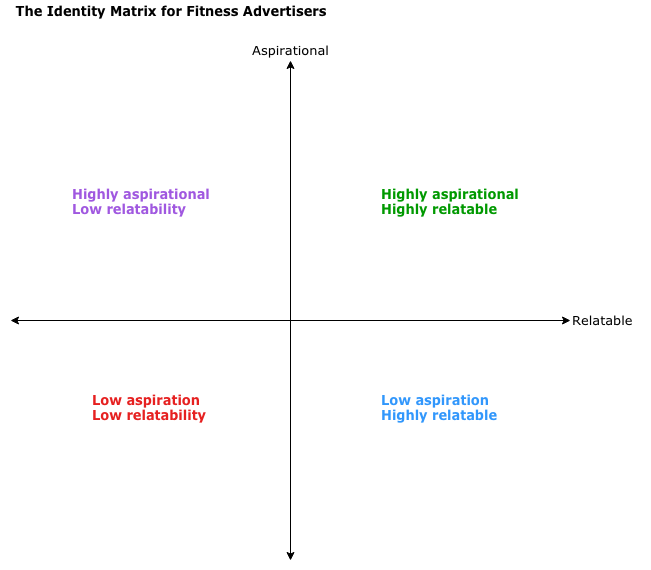
Here’s how we break down each axis:
- Aspirational fitness ads are inspiring. Aspirational content shows us our #goals, our perfect selves, the fitness ideals we want to achieve.
- Relatable fitness ads reflect our current selves. Relatable content shows us people who look like us, explains how to make incremental changes, and makes fitness a personal choice.
There are benefits to making ads that rank higher on one scale than the other. For instance, Red Bull’s adventure videos bring us amazing stories of incredible athletes, and we don’t need to relate to them to be inspired by their feats. But most advertisers should stay away from the lower-left quadrant. When you’re selling a product that neither inspires nor reflects, people won’t be moved to get up from the couch.
We analyzed 11 top fitness ads on Facebook to see how they ranked on each scale. Here’s how we plotted them:
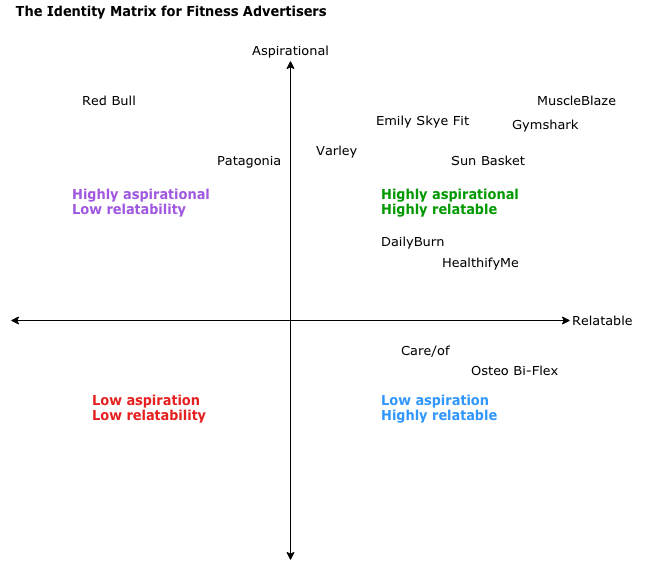
The following is our in-depth analysis of each ad. We’ll discuss the aspirational and relatable qualities of the ad and why it works for that health or fitness brand.
Patagonia aspires to adventure
For their updated, yet classic, Baggies shorts, Patagonia advertises a life of adventure. The video montage of images and video shows people being active in the shorts, doing everything from surfing to yoga.
The video veers towards the aspirational – after all, not everyone lives near the beach or can be so extreme in their interests. But it’s also relatable because the actors are shown in their homes and with their kids. These aren’t pro athletes, just everyday fit people trying to create extraordinary lives.
People who identify with Patagonia’s adventurous, nature-loving branding will go for these shorts.
Matrix position: Highly aspirational, Low relatability
Sun Basket lets you try on healthy lifestyles
Sun Basket is a meal delivery service for the health-conscious – however you define that term. In their video, they advertise their different meal kits for vegans, paleo, and weight loss, giving the viewer broad choices on how to make healthy eating work for them.
The aspirational aspect here is that any diet has to become a complete lifestyle change in order to work. You can’t just become a vegan overnight. However, experimenting with the various meals will make the idea of taking the first step towards a new lifestyle less intimidating.
For the choosy, yet undecided, eater, Sun Basket’s videos will be an inspiration to try out a new way of eating well at home.
Matrix position: Medium aspiration, Highly relatable
Care/of rejects one size fits all
For a millennial audience, identity is everything. Care/of’s video ads emphasize that their vitamin packs are customized for each particular body.
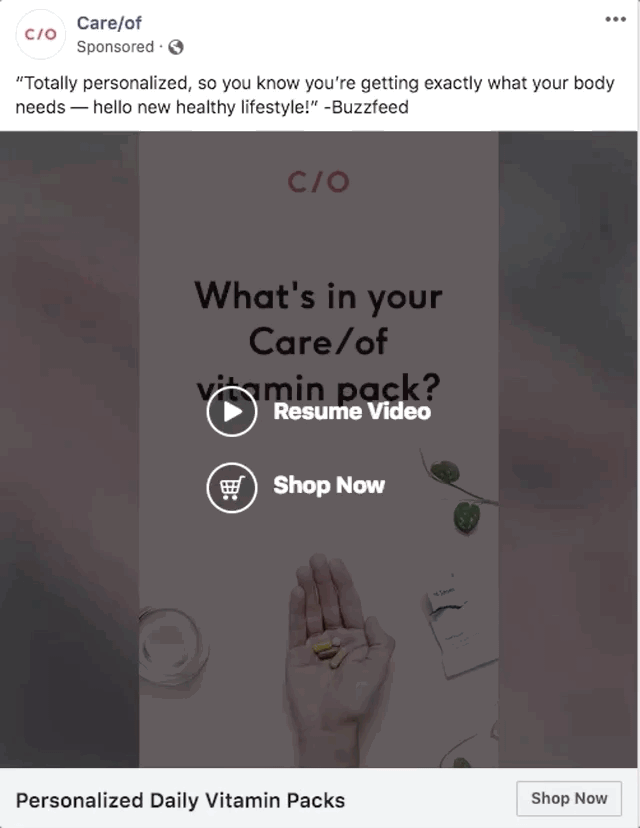
The video goes on to characterize each supplement and also Care/of’s approach to wellness. Two of the pills help with stress, which is something that affects everyone at one point or another. This puts Care/of high on the relatable axis and fairly low on the aspirational one. However, for people aspiring to better moods and a more dedicated daily vitamin routine, Care/of provides an ideal solution.
Matrix position: Low aspiration, Highly relatable
Varley elevates yoga to high fashion
In their product-focused video ad, yoga apparel line Varley uses the tagline “We sweat the details.” The yoga pants are expertly and artfully crafted, from top to toe. These are fashion leggings, not your average sweat gear.
On the aspirational axis, Varley ranks highly. Though many people would like to find time to do yoga, let alone look great in class, luxury workout clothes are not really necessities.
On the relatable end, Varley struggles a bit, especially since they use runway-esque models. But they do show models of different races, making it a bit easier to identify with the yogis displayed.
At the same time, big yoga brands like Alo Yoga and Lululemon have been immensely successful, creating a new category of “athleisure wear” that’s flexible and attainable for women on-the-go. Varley fits into this niche, making beautiful clothes that transition well from the studio to everyday life.
Matrix position: Highly aspirational, Medium relatability
HealthifyMe puts fitness at your fingertips
HealthifyMe is a very popular fitness and calorie-tracking app, comparable to MyFitnessPal, for the Indian market. In their Facebook case study, the company discusses how they created short ads focused on the product as well as “longer video ads that featured stories of real people’s transformation journeys.” In these video ads, coaches discuss how they helped individuals reach their fitness and weight-loss goals.
Transformations are wildly popular across social media because they speed up time in a satisfying yet unrealistic way. A video of a transformation essentially fast-forwards through the slow yet necessary process of making incremental changes in order to show the end result.
A transformation is aspirational because it’s not something you can achieve right this moment. However, HealthifyMe ads balance the transformations with content about how easy it is to get started. In fact, you can download the app right away and make small changes immediately, like exchange a bag of chips for an apple, in order to save calories.
Everyone wants to see an end result; but HealthifyMe ads also show how to get there, which is what makes their video ads effective.
Matrix position: Medium aspiration, Highly relatable
MuscleBlaze salutes weekend warriors
Another top Indian fitness brand, MuscleBlaze, makes protein supplements and snacks to power your workout – and your life.
Their highly successful video ad, which garnered 5 million unique views and increased MuscleBlaze’s website traffic by 100%, shows everyday athletes completing impressive feats of physical fitness in somewhat unusual circumstances – the office, for instance, or late at night on the roof of a building.
The gritty, “just get it done, where and when you can” attitude captures so many “weekend warriors” and is highly relatable to anyone who works full-time yet takes their fitness seriously. The ad is also motivating for people who sometimes see themselves that way but may need a push to get their performance to the next level. The celebration of normal, working people going above and beyond to achieve their goals sits right at the intersection of incredibly inspiring yet totally possible, which is why the ad’s success is not surprising.
Matrix position: Highly aspirational, Highly relatable
Daily Burn makes daily workouts accessible
Consistent motivation is key to making fitness a habit. Daily Burn has made daily exercise a cornerstone of their product (it’s in the name) as well as their Facebook marketing strategy. Their live workouts allow you to sample Daily Burn workout videos for free, and ads encourage you to download the app in order to do the routines on your own time.
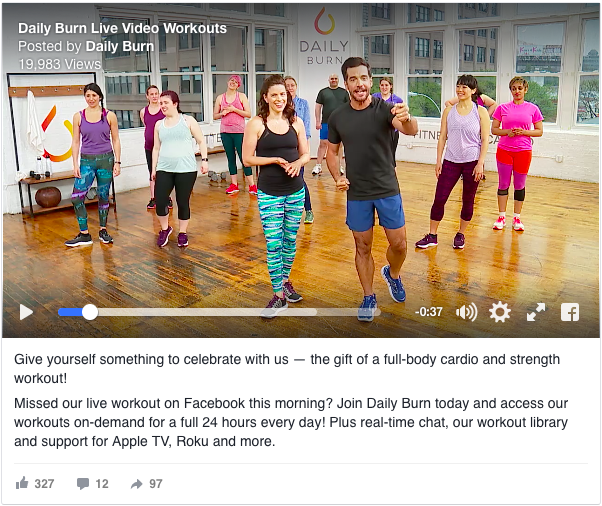
This “whatever works for you” flexibility makes the product very appealing. You can do Daily Burn workouts on your mobile device, laptop, TV, or on Facebook. No one wants to be forced or shamed into a workout, but if there are tons of opportunities to take a class, it’s a lot easier to commit. Plus, Daily Burn’s videos feature real fitness students, showing how each class has something for everyone. They make fitness look fun, which is a necessary ingredient to meet the aspirational (for some) goal of daily exercise.
Matrix position: Medium aspiration, Highly relatable
Osteo Bi-Flex celebrates all definitions of fitness
Not every health ad focuses on peak athletic performance or a mega-active lifestyle. Sometimes fitness means being able to do everyday things you enjoy without pain.
Osteo Bi-Flex is a supplement targeted to an older audience, members of whom struggle with joint pain and arthritis. Their video ads show appropriately aged actors in ordinary scenarios, such as reading the morning paper, baking, or shopping.
These scenes are highly relatable to the target audience as things they used to be able to do. For someone experiencing daily pain, the ability to achieve normal tasks without assistance is an aspirational goal as well as an attainable one.
By speaking to common desires, Osteo Bi-Flex shows a deep understanding of their demographic and therefore makes a strong impression in a short amount of time.
Matrix position: Low aspiration, Highly relatable
Red Bull shares unbelievable stunts
You won’t learn much about energy drinks from Red Bull’s advertisements, but their ads are so memorable and shareable, and their brand so recognizable, it doesn’t matter. Red Bull’s video campaigns are off the chart when it comes to aspirational content: their fitness ads often feature world-class athletes in extreme or adventure sports like ski jumping, mountain climbing, or BMX biking. One Facebook video ad features Parkour athlete Pavel Petkuns freerunning through the canals of Venice.
You’d have to be crazy to attempt the stunts in this video on your own, so the video is not exactly relatable. Red Bull’s content embodies the cliché, “Don’t try this at home.” And yet, Red Bull’s unusual fitness ads might just motivate you in a different way. After all, if Petkuns can flip over a medieval wall using only his core strength, you can at least get off Facebook and go for a walk.
Matrix position: Highly aspirational, Low relatability
Gymshark uses relatable influencers
Gymshark is one of the fastest-growing companies in the UK right now, and its unique approach to fitness advertising has made it a hit on social media, particularly Instagram, but also Facebook and YouTube.
Gymshark’s strategy mainly utilizes influencers who embody a particular attitude and aesthetic that’s far more relatable than most fitness content. Gymshark’s Facebook ads featuring Whitney Simmons show bite-size workouts you can do at home with minimal equipment.

Simmons is a fitness influencer who built her following by talking openly and honestly about her own journey to fulfillment and happiness in the gym. Her physique is enviable, but the way she achieved it was ordinary. By tying their products to their brand rep’s personal stories, Gymshark can market itself as a brand that supports internal fitness as well as external.
Matrix position: Highly aspirational, Highly relatable
Emily Skye does it all herself
Social platforms have opened up worlds of opportunity for self-made fitness entrepreneurs, including personal trainers, nutritionists, competition coaches, and gym owners.
Emily Skye is one such entrepreneur who’s built a coaching business off the back of her own fitness journey.
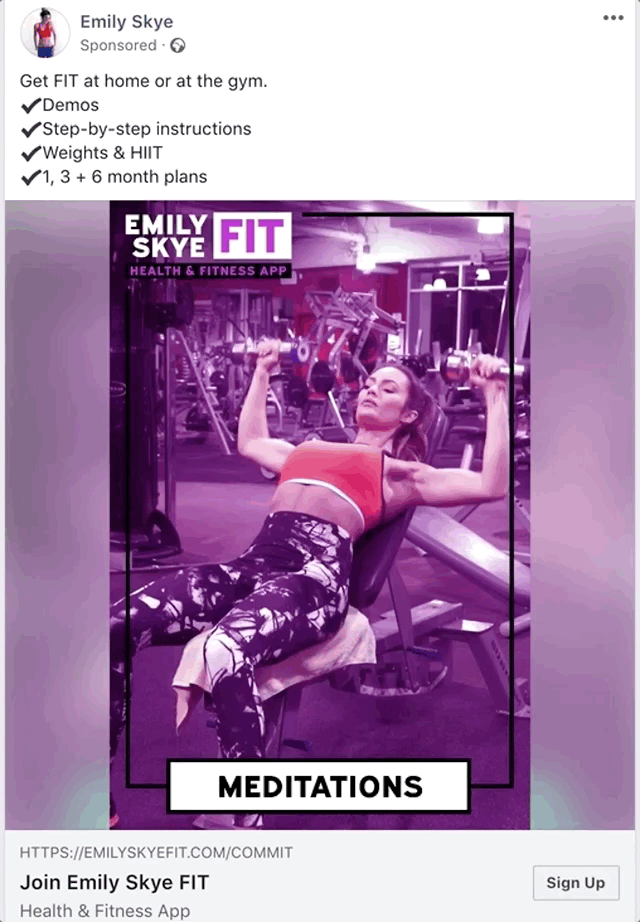
She originally shared the story of how she got started with weight training in an Instagram post that showed her before-and-after photos. Surprisingly, the message she shared was that sometimes gaining weight is good – it all depends on how you feel.
The video ads for Skye’s fitness and nutrition app build on the relatable aspects of Skye’s go-getter personality and break down exactly how you can get fit at home or at the gym. Skye’s videos also emphasize the 7-day free trial so that users can choose whether or not they want to go for it.
By building her fitness ads around her own activity and persona, Skye turns herself into a relatable figure that other ambitious women can look up to.
Matrix position: Highly aspirational, Highly relatable
Trending towards relatability
While incredible feats of athleticism and perfect bodies will always have a place in fitness marketing, we think the future looks a bit more relatable. Since the fitness industry is so saturated, marketers will need to target individuals more and more. As audiences get more defined, and advertisements become more personalized, people will want to see content that speaks directly to them. Video is the perfect opportunity to create content your users identify with. When they see themselves in your advertisements, they’ll be more likely to connect with your products.



3 comments On 11 of The Best Fitness Ads on Facebook
Pingback: 11 of The Best Fitness Ads on Facebook | Viral Top Feeds ()
Pingback: 11 of The Best Fitness Ads on Facebook – Just Internet Marketing ()
Pingback: 11 of The Best Fitness Ads on Facebook | Local Business Hero ()
Comments are closed.